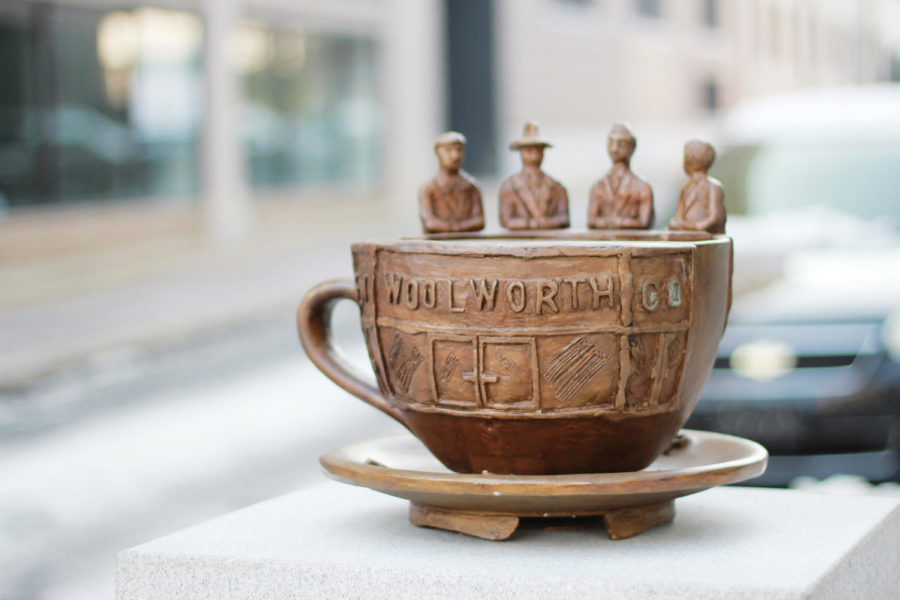Member of original Greensboro Four to speak at Iowa State
This carving features the Greensboro Four, one of whom, Joseph McNeil, is speaking at the Memorial Union on Tuesday.
February 14, 2011
Four black college freshmen sat down at the lunch counter inside a Woolworth’s department store in Greensboro, N.C., and asked for a cup of coffee.
This simple act on Feb. 1, 1960, sparked a movement that would change the course of the nation.
Joseph McNeil, one of the young men who started this movement, will be speaking at Iowa State on Tuesday in celebration of Black History Month.
McNeil and his friends Franklin McCain, Ezell Blair Jr., and David Richmond went into Woolworth’s that day with a purpose. As African-Americans living in a world divided by segregation, these four young men, now known as the Greensboro Four, decided they could no longer be passive in their desire for equality, but that they had to take a stand.
In this case, taking a stand meant sitting down.
When the staff at Woolworth’s refused to serve these young men because of their race, they remained seated until the store closed. They returned to Woolworth’s the following day and continued their peaceful protest – this time they were joined by 20 more students. By the fourth day more than 300 protestors joined the sit-in. By the end of the week the movement had spread across the state, and eventually there was a total of 54 cities across nine states that were involved in the protest. Media coverage spread the influence of this movement across the nation.
On Feb. 16, 1960, Martin Luther King Jr. addressed the Greensboro sit-ins.
“What is fresh, what is new in your fight is the fact that it was initiated, fed and sustained by students,” King said. “What is new is that American students have come of age. You now take your honored place in the worldwide struggle for freedom.”
The sit-ins and boycotts were continued with the help of both African-American and white students across nine states until July 25, 1960, when the entire Woolworth’s chain became desegregated.
The International Civil Rights Center and Museum was opened in the same Woolworth’s store that McNeil and his friends protested in 51 years ago Feb. 1.
David Bulla, associate professor in the Greenlee School of Journalism and Communication, is studying the coverage of the Woolworth sit-ins by the African-American press.
This story was first told by local media and was soon picked up by the Associated Press, the New York Times and national television stations, Bulla said, also a Greensboro native.
Bulla said that hearing McNeil speak in person is an opportunity ISU students should take advantage of.
“It is important for our students to hear these stories firsthand while they still can, because these historical figures are dying out,” Bulla said.
McNeil’s visit to Iowa State is coincidentally taking place 51 years after the visit King made to Iowa State on Jan. 22, 1960. King’s visit to Iowa State occured only days before the Greensboro sit-ins began.
“The members of the Committee on Lectures were happy to support this event that is of such historical significance,” said Pat Miller, director of the Lectures Program. “What an opportunity for the students and faculty to actually hear the details about this important event from one of the organizers.”
Aja Holmes, member of the Black Graduate Student Association and the Black History Month planning committee, said that during her study of the civil rights movement, the story of the Greensboro Four stood out to her because this act was non-violent and was started by young people.
“When the four young men decided to take a stand against segregation, they were freshmen in college,” Holmes said. “I hope this lecture will inspire and motivate ISU students to stand up for what they believe in. I hope students of all races will reflect on how they can make difference in our world today.”
McNeil’s lecture, “Reflections of One of the Greensboro Four,” will be at 8 p.m. Tuesday in the Great Hall of the Memorial Union. The presentation will be free and open to the public.

















